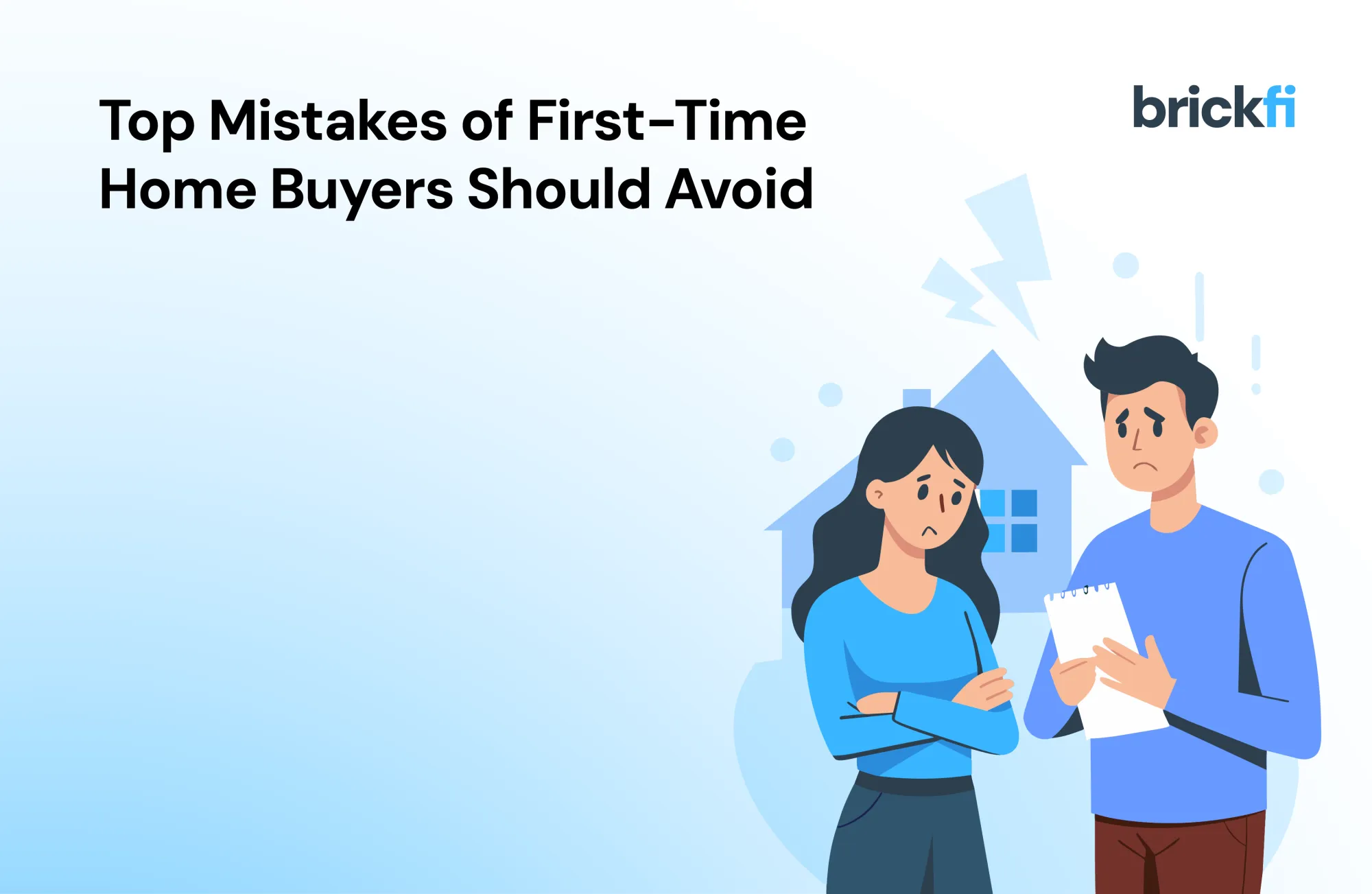Top Mistakes First-Time Home Buyers Should Avoid

Overview:
Buying a home for the very first time is exciting, emotional, and often overwhelming. For most people, it is the biggest financial decision of their lives. The thought of having your own space creates joy, but the process comes with a long list of responsibilities, paperwork, and financial planning. This is where many first-time buyers falter.
From overlooking hidden costs to skipping legal checks, the mistakes made during a property purchase can create long-term stress. A wrong choice can result in financial strain, delayed possession, or worse, legal disputes. To help you avoid common pitfalls, let us explore the top mistakes that first-time home buyers make and how you can navigate them wisely.
Mistake 1: Not Defining a Realistic Budget
Many first-time buyers begin their home search without deciding exactly how much they can afford. A vague idea of budget often leads to two scenarios. Either you overstretch your finances by committing to an expensive property or you waste time looking at homes outside your reach.
It is not only about the property price. Registration fees, stamp duty, maintenance charges, interior setup, and loan processing costs must be factored in. Buyers should also plan for emergencies such as job loss or interest rate hikes. The absence of a clear financial plan is one of the most common mistakes first-time buyers make.
Mistake 2: Ignoring Pre-Approval for Home Loans
Some buyers assume they can arrange a loan once they select a property. Without pre-approval, you risk disappointment when you realise the bank will not finance as much as you expected. Pre-approval helps you set a practical price range and gives confidence when negotiating with builders or sellers.
It also signals to developers that you are a serious buyer. In markets like Bangalore or Pune, where demand is high, sellers often prioritise buyers who come with pre-approved loans because they know the deal will move faster.
Mistake 3: Overlooking Hidden Charges
The property brochure rarely tells the whole story. First-time buyers often get surprised by hidden charges such as parking fees, GST on home loans, administrative charges, or maintenance deposits. There are also prepayment penalties and late EMI fees that can increase financial stress if not considered earlier.
Carefully reading the agreement and asking the builder for a detailed breakdown of all charges can help you avoid these shocks. Always remember that the price advertised is not the final price you will pay.
Get instant access to expert, data-driven property insights.
Request your free Brickfi investment report now and make smarter real estate decisions today.
Mistake 4: Skipping Legal and Compliance Checks
It is tempting to trust a builder’s promises or rely on a broker’s word, but failing to verify documents is one of the riskiest mistakes. First-time buyers must check the title deed, encumbrance certificate, RERA registration, and all project approvals. Without these, you risk buying a property that may face legal disputes or construction delays.
Legal due diligence may sound complex, but it protects your life’s savings. Engaging a real estate advisory or legal consultant is often better than trying to figure it all out on your own.
Mistake 5: Choosing Location Only by Price
A property on the outskirts might look cheaper, but if it adds hours to your daily commute, the long-term cost outweighs the savings. Many first-time buyers make the mistake of prioritising only the price per square foot, ignoring factors like connectivity, schools, hospitals, and future infrastructure.
Location determines appreciation value as well. A slightly more expensive property in a developing hub with good connectivity may give better returns than a cheap home in a remote pocket.
Mistake 6: Trusting Word of Mouth Over Data
In many cases, buyers make decisions based on a friend’s suggestion or a broker’s sales pitch. While personal recommendations are useful, relying solely on word of mouth without checking the data is risky.
First-time home buyers should use verified reports, market analytics, and project histories to evaluate builder credibility and property performance. What worked for a friend five years ago may not hold true in today’s market.
Mistake 7: Ignoring Future Financial Commitments
A home loan is not just about monthly EMIs. First-time buyer mortgages usually extend for 15 to 20 years. During this time, life changes. You may want to start a family, invest in education, or deal with medical costs.
If your mortgage consumes most of your income today, it leaves little flexibility for tomorrow. Many first-time buyers fail to account for this and end up feeling trapped. Experts suggest keeping EMIs below 30 to 35 percent of your monthly income to maintain balance.
Mistake 8: Not Considering Resale and Rental Potential
Some buyers purchase homes without thinking about future scenarios. Even if you plan to stay in your house forever, life can change. You might relocate for work or decide to upgrade. Properties with poor resale value or low rental demand can limit your options.
First-time buyers should always evaluate how easy it would be to rent or resell their property in the future. Factors like proximity to IT parks, metro stations, or educational hubs strongly influence resale potential.
Get instant access to expert, data-driven property insights.
Request your free Brickfi investment report now and make smarter real estate decisions today.
Mistake 9: Rushing Into a Decision
Property buying is often driven by emotions. First-time buyers fall in love with a show flat and rush to book without fully exploring other options. Builders and brokers use limited-period offers to create urgency, making buyers act fast.
While delaying too long can also cost opportunities, it is wiser to research thoroughly, compare projects, and inspect multiple sites before signing any cheque. A home is not just a purchase. It is a long-term commitment.
Mistake 10: Underestimating Maintenance and Upkeep
Owning a home comes with responsibilities. First-time buyers often underestimate monthly maintenance costs, sinking funds for repairs, and future upgrade expenses.
If you move into a high-rise with luxury amenities, the fees for security, swimming pool, or club facilities can be significant. Always check the builder’s proposed maintenance charges and estimate long-term upkeep before deciding.
Mistake 11: Falling for Unrealistic Promises
Builders sometimes advertise possession timelines that are impossible to achieve. First-time buyers trust these promises without verifying project history. Delayed possession has been one of the biggest frustrations for homebuyers across India.
Checking the builder’s past delivery record and verifying RERA compliance can save you from years of waiting. Do not assume that glossy brochures or model apartments guarantee timely handover.
Mistake 12: Not Factoring in Lifestyle Fit
Beyond price and location, many first-time buyers forget to ask whether a property suits their lifestyle. If you are a young couple working in the city, a remote villa project may look attractive today but could become inconvenient later. If you have parents living with you, proximity to healthcare should be a priority.
Buying your first home is about comfort as much as it is about investment. Ignoring lifestyle needs often leads to regret.
Practical Steps to Avoid These Mistakes
- Start with a clear budget including registration, taxes, interiors, and emergency buffers.
- Get a home loan pre-approved before shortlisting properties.
- Request a full fee breakdown from the builder, including hidden charges.
- Verify every legal document or hire a professional to do so.
- Choose location based on connectivity, amenities, and growth potential, not just price.
- Use reliable data and reports to evaluate builder credibility.
- Keep EMIs within a manageable share of your income.
- Assess resale and rental value even if you plan to live there.
- Take time to compare multiple projects and avoid impulsive decisions.
- Calculate monthly maintenance and upkeep before finalising.
- Research builder delivery history and check RERA compliance.
- Consider family needs and lifestyle fit when selecting a property.
Conclusion: Best Tips for Home Buyers
Buying your first home is a milestone, but it does not have to come with regret. Avoiding the common mistakes first-time home buyers make can save you from financial stress, legal trouble, and long-term inconvenience. With clear planning, verified information, and the right guidance, you can make a choice that secures your future and brings peace of mind.
At BrickFi, we help first-time buyers navigate these challenges with data-backed reports and end-to-end advisory. From verifying builder credibility to explaining hidden charges, our approach ensures that your first property purchase is safe, transparent, and rewarding.
FAQs: Common mistakes first-time home buyers make
What is the most common mistake first-time home buyers make?
Not budgeting properly and ignoring hidden costs like registration, taxes, and maintenance.
Do first-time buyers always need a mortgage pre-approval?
It is highly recommended. Pre-approval sets a realistic budget and gives you an edge with sellers.
How can I check if a builder is trustworthy
Look at past delivery records, RERA registration, and seek professional credibility reports.
Is it okay to buy property just based on low price
No, price should not be the only factor. Location, infrastructure, and lifestyle fit are equally important.
Get instant access to expert, data-driven property insights.
Request your free Brickfi investment report now and make smarter real estate decisions today.
